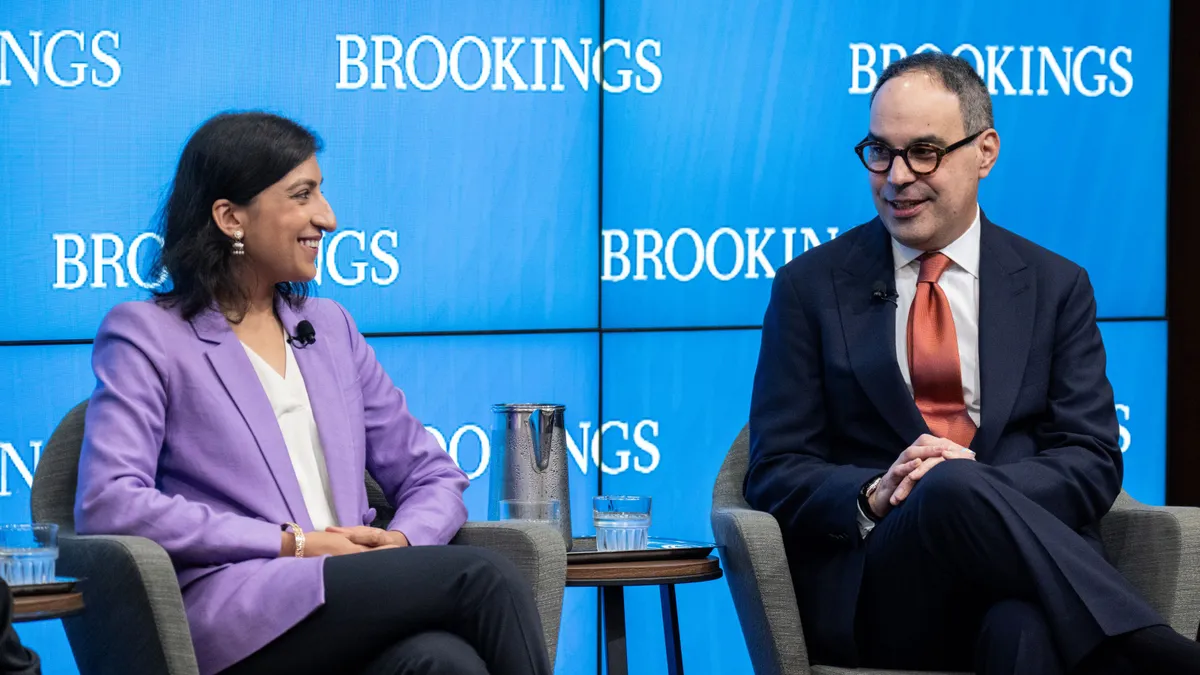Many business leaders expect a more relaxed regulatory environment in Washington as the Biden administration ends next week. At the same time, plenty of conservatives welcomed the muscular antitrust approach Biden brought to the Federal Trade Commission and Justice Department.
These forces are likely to collide in the second Trump administration, which has given parties on both sides of the antitrust enforcement divide reason for optimism.
To help understand how the competition landscape may shift in 2025, Legal Dive spoke with Kellie Lerner, managing partner at Shinder Cantor Lerner, a boutique antitrust firm which formed in October 2024. Lerner is an antitrust litigator who represents primarily private plaintiffs.
She says Trump’s selection of FTC Commissioner Andrew Ferguson and Gail Slater, a former policy adviser to incoming Vice President JD Vance, to oversee the Justice Department’s antitrust division, suggests that the populist elements of Trump’s party will carry influence within the administration.
Editor’s note: Legal Dive’s conversation with Lerner has been edited for clarity and length.

LEGAL DIVE: How much change should U.S. companies anticipate in antitrust enforcement under Trump?
KELLIE LERNER: I think that there is going to be a lot of continuity because antitrust has become a populist issue. And I think in many respects, the Biden administration laid out the case for why antitrust matters and how it impacts everyone’s day-to-day. With the Epic Games settlement, gamers were getting checks and they could translate that to antitrust enforcement. Hearing aid accessibility, all of these things that happened over the Biden administration that actually trickled down to the average consumer, has made it a populist issue, and people like JD Vance and the administration are going to take that baton and run with it. I don’t think you can unscramble the egg at this point, because the demand is there from the population who now understands the meaning of antitrust and how it can help them in their day-to-day lives, and Trump's appointments to the agencies reflect that continuation.
What about mergers?
I do think that there will be a cooling of merger challenges, an uptick in actual deals announced. Because I think there will be an expectation that there will be some lighter touch on enforcement. That being said, Andrew Ferguson, the new head of the FTC, has already said he would not want to roll back the 2023 merger guidelines. They’ve already been cited favorably by courts at least close to a dozen times. Maybe there [will] be some tweaks, some clarifications, but he’s not rolling them back. There is this psychological reaction that Trump is going to be less aggressive against deals, and that might be true around the edges, but I think there is a lot to build on from the track record of the Biden administration on antitrust.
It’s two buckets of enforcement that were ramped up during Biden. One was just resurrecting traditional antitrust enforcement that had lagged for decades. That antitrust enforcement, I think, we're going to see it continue because of the populist movement. Then there was some antitrust enforcement that was a little more on the fringe. For example, no-poach cases were something that really hadn’t been brought before, and the Biden administration and with its antitrust enforcers focused on that, we might see a downward trend in some of those newer ways that they push the boundaries of antitrust. But the traditional antitrust that just hadn’t been used in a long time, I think we’re going to definitely see that continue.
Isn’t an element of large corporate political donations designed to avoid Biden’s antitrust approach? Won’t Trump need to be responsive to his larger donors?
Sometimes. Ferguson, as an example, is very anti-Big Tech. I think he said he wanted to end Big Tech’s vendetta against competition, censorship. Putting someone like that at the helm is somewhat at odds with some of the donations that Trump’s received. That being said, I would not be surprised if Trump swoops in and avoids a breakup of Google. I could see that happening. I am not foolish enough to predict anything about what Trump himself is going to do. He has a lot of competing interests to pacify, and we just saw how this played out with DOGE (Department of Government Efficiency) and the anti-immigration faction of his party, and how those two factions are now warring. I could see something similar happening when it comes to antitrust enforcement, where you have populist JD Vance and others who really want to continue to push this, while at the same time a tech industry that heavily bankrolled Trump’s campaign having serious concerns with that. So I don’t know how that will play out and get resolved, but I agree it’s a tension that he’s going to have to navigate.
You mentioned Big Tech. Do you think we’ll see an antitrust approach that is industry specific, where distinctions are made based upon the administration’s view of an industry like energy or healthcare or finance rather than a general philosophy?
It’s a reasonable view to try to balance the competing interests by thinking that it will be so orderly and organized that ultimately it will be industry by industry. I’m just not sure there are levers that can be pulled and there are levers that can’t be pulled. It may be that you’re just going to see different outcomes among players in the same industry because of these competing factions.
How does a company manage within the Trump environment? Is it about political donations? Public statements? What gets corporate counsel a good outcome?
If I’m in-house counsel for a company that is under antitrust scrutiny, I’m going to focus on a principal defense. I am not one to go litigate my cases on (social media platform) X. I know it makes a lot of noise. It makes for good news articles. But I’m not sure it’s changing the outcome. There’s plenty to work off of with first principles. Those who attacked Lina Khan, as an example, portray her as this rogue crusader. I disagree. I think that much of what she and Jonathan Kanter did is go back to first principles of antitrust. So, as a counsel to an in-house general counsel, I would be advising them, ‘Let’s go back to the basics. Let’s come up with a defense. Let’s look at the most recent merger guidelines. Let’s look at the most recent law applying them.’ And I would defend my case that way, because I don’t think for most traditional antitrust that you’re seeing anything that is dramatically new. It’s just re-enforced after being dormant for way too long.
Do you think we’ll see more M&A approved with remedies and consent decrees from the DOJ or FTC?
There is going to be renewed energy around dealmaking for a variety of reasons, not just antitrust enforcement, but there’s going to be renewed energy. And this DOJ and FTC might be slightly more selective about what cases they want to actually take to trial. And if they can get a consent decree with a remedy that satisfies them, I could see that.
Is there anything you would take in antitrust from the first Trump administration as applicable now?
Trump 1.0 started the Google case. So there is something there to build off of. But I also think Biden created a path for them that didn’t exist before that could lead to a more active antitrust division under Trump 2.0. And there’s much more case law now. (At) the DOJ, I think it’s seven successes blocking mergers — again, back to the populism. Consumers understand now what Kroger-Albertsons as one could have done to them in terms of the prices they pay at the supermarket. I think we will see more of it than we did in Trump 1.0 because of the framework that Biden has now laid out for them.



















